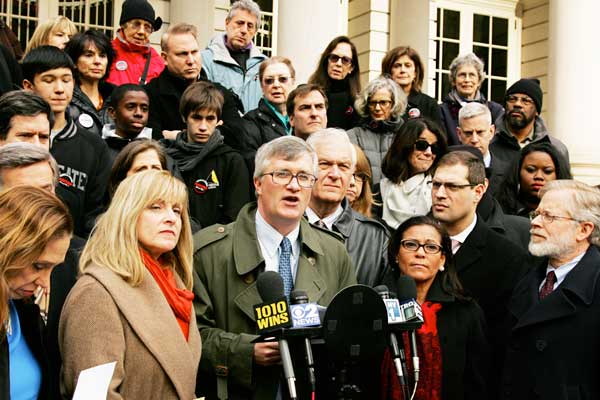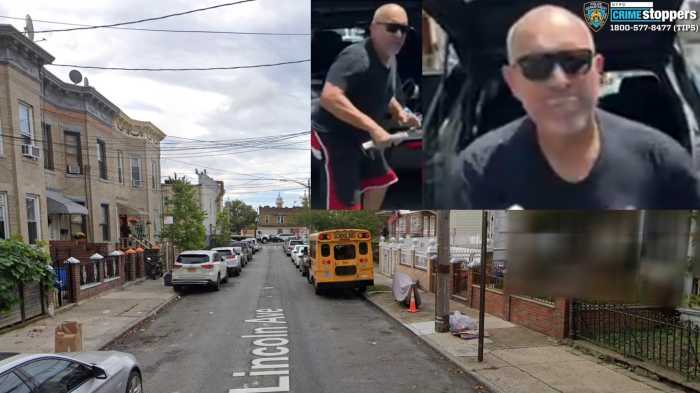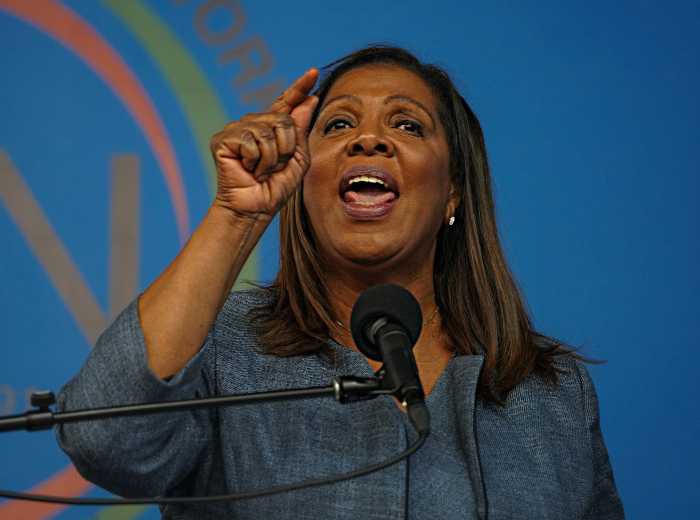
BY SAM SPOKONY | For state Assemblymember Brian Kavanagh and state Senator Daniel Squadron, the push for gun control has been like a record on repeat.
Back in October, both led the unsuccessful call for a legislative special session to pass laws strengthening New York’s restrictions on firearm sale and possession — already some of the strongest in the nation — and Squadron published an op-ed in the Daily News to argue the “common sense” perspective behind added gun control measures.
“Before another drop of blood is spilled and another innocent life is lost, New York’s Legislature must do our job and pass these bills,” Squadron wrote in the op-ed.
This was more than two months before the shooting at Sandy Hook Elementary School in Connecticut that left 26 people — including 20 children — dead, and re-energized the gun debate across the nation. That tragedy was most recently followed by another shooting on Monday in the Upstate town of Webster, N.Y., in which a 62-year-old man shot four firefighters — killing two — before committing suicide.
Now Kavanagh and Squadron, whose districts overlap in the East Village, are reiterating their argument as part of a coalition of 63 lawmakers from both houses that is led by Kavanagh, Assemblymember Michelle Schimel and Senator Eric Adams of Brooklyn — the three of whom are co-chairpersons of State Legislators Against Illegal Guns.
In a Dec. 20 letter to both Democratic and Republican leaders in the Senate and Assembly, the coalition highlighted a package of bills that would strengthen the state’s ban on assault weapons (notably, without grandfathering previously legal guns), require universal background checks on the sale of all guns, and ban the possession and sale of all high-capacity ammunition magazines of more than 10 bullets.
Among other things, the bill package also includes microstamping, a widely debated, new technology that imprints a unique code onto shell casings every time a gun is fired. Advocates for the technology believe it would allow law enforcement to more easily track and capture those responsible for gun crimes, but pro-gun skeptics have claimed that it would hamper lawful firearm owners rather than cause a significant crime reduction.
To Kavanagh and Squadron, the proposed reforms are all still simply common sense — but, in the wake of tragedy, the receptiveness to ideas behind gun control is gaining more traction both with other lawmakers and the general public.
“These are obviously not new issues, and the Connecticut shooting certainly isn’t the first horrific incident to have taken place,” Kavanagh said after a Dec. 20 press conference outside City Hall. “But I think there’s a growing sense of commonality around this now. The climate has changed since we called for the special session in October, and while we have an ambitious agenda, we think it’s doable.”
There was brief talk of a special legislative session being held before the New Year, but those dissolved nearly as soon as they began. Governor Andrew Cuomo has instead said that he plans to outline his gun control proposal in his State of the State Address on Wed., Jan. 9.
And when Kavanagh and Squadron do go back to Albany in January for the start of the next session, they will continue to face vastly different environments. The Democrat-led Assembly has already passed similar gun control measures in previous sessions, and Assembly Speaker Sheldon Silver has been an outspoken supporter of the bills currently on the table.
The Republican-led Senate, on the other hand, has consistently stymied past gun control efforts, often leading to a bill-killing stalemate. Senate Republican spokesperson Scott Reif has been quoted as saying that lawmakers should find “common ground” in pursuing laws to prevent future tragedies, but pointed out that Dean Skelos, the Republican Senate majority leader, believes the answer lies in “increasing penalties” and enacting mandatory minimum sentences for gun crimes.
Of the 63 legislators currently signed on as part of the gun control coalition, none are Republicans.
But Kavanagh said on Thursday that he and his allies have been actively communicating with their counterparts across the aisle. He had previously stressed his belief that political divides should not play a role in this debate.
“Our message is not distinguished by partisanship,” he said at the Dec. 20 press conference. “We do not believe this is a partisan issue.”
And of the aforementioned coalition members, seven are newly elected lawmakers, the beginning of whose state-level careers will likely be colored by the outcome of this legislation.
Senator-elect Brad Hoylman, who will replace the retiring Tom Duane come January, did not speak but was present outside City Hall on Dec. 20.
“I know we should’ve acted sooner to do something about this, and that’s why I was there with [Kavanagh and Squadron] when they were calling for a special session back in October,” Hoylman said after the press conference. “But now I think we’ve seen the issue crystallize, and at this point we just need to do whatever it takes to get it done.”
Meanwhile, New York’s gun advocates still think that new restrictions on firearm use and sale aren’t so commonsense.
“They’re looking to take the easy way out,” said Thomas King, president of the New York State Rifle and Pistol Association, “rather than looking at the core issues, which are the social problems that breed these horrendous acts. Simply put, gun control laws will make no one in this state safer.”
King added that, by social problems, he was referring to treatment of the mentally ill, as well as the state’s criminal court system, which he believes is too lax when it comes to paroling convicts who have the potential to strike again. He cited the case of William Spengler, the shooter in the recent Webster, N.Y., killings, who had been released after serving 17 years in state prison on manslaughter charges. Spengler was convicted of beating his 92-year-old grandmother to death with a hammer in 1980.
It’s also apparent that many of the state’s gun advocates are flocking to organizations like King’s N.Y.S.R.P.A. in the wake of the Connecticut and Webster shootings, anticipating the long battle of public opinion that will undoubtedly become even more heated once the legislative session begins.
King admitted that he “doesn’t really know” whether or not his organization his seen an uptick in recent donations, but said that there has been a “big increase” in membership over the past few weeks.




































